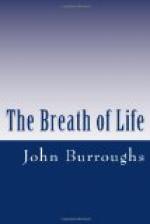I have wondered if Huxley was aware that both ends of his argument did not quite meet when he contended for the truth of determinism—that there is and can be no free or spontaneous volition; and at the same time set man apart from the cosmic order, and represented him as working his will upon it, crossing and reversing its processes. In one of his earlier essays, Huxley said that to the student of living things, as contrasted with the student of inert matter, the aspect of nature is reversed. “In living matter, incessant, and so far as we know, spontaneous, change is the rule, rest the exception, the anomaly, to be accounted for. Living things have no inertia, and tend to no equilibrium,” except the equilibrium of death. This is good vitalistic doctrine, as far as it goes, yet Huxley saw no difference between the matter of life and other matter, except in the manner in which the atoms are aggregated. Probably the only difference between a diamond and a piece of charcoal, or between a pearl and an oyster-shell, is the manner in which the atoms are aggregated; but that the secret of life is in the peculiar compounding of the atoms or molecules—a spatial arrangement of them—is a harder proposition. It seems to me also that Haeckel involves himself in obvious contradictions when he ascribes will, sensation, inclination, dislike, though of a low order, to the atoms of matter; in fact, sees them as living beings with souls, and then denies soul, will, power of choice, and the like to their collective unity in the brain of man.
A philosopher cannot well afford to assume the air of lofty indifference that the poet Whitman does when he asks, “Do I contradict myself? Very well, then, I contradict myself”; but he may take comfort in the thought that contradictions are often only apparent, and not real, as when two men standing on opposite sides of the earth seem to oppose each other, and yet their heads point to the same heavens, and their feet to the same terrestrial centre. The logic of the earth completely contradicts the ideas we draw from our experience with other globes, both our artificial globes and the globes in the forms of the sun and the moon that we see in the heavens. The earth has only one side, the outside, which is always the upper side; at the South Pole, as at the North, we are on the top side. I fancy the whole truth of any of the great problems, if we could see it, would reconcile all our half-truths, all the contradictions in our philosophy.
In considering this problem of the mystery of living things, I have had a good deal of trouble in trying to make my inborn idealism go hand in hand with my inborn naturalism; but I am not certain that there is any real break or contradiction between them, only a surface one, and that deeper down the strata still unite them. Life seems beyond the capacity of inorganic nature to produce; and yet here is life in its myriad forms, here is the body and mind of man,




